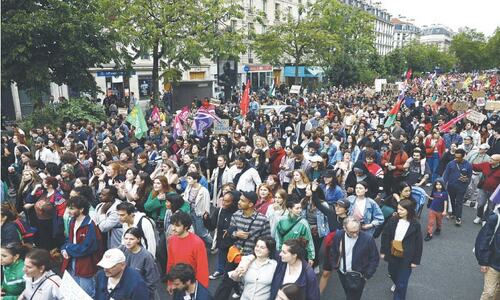SYDNEY: Sydney’s beaches are renowned for their white sand and blue waters, but 10 years ago, one picturesque spot was the site of modern Australia’s worst race riot, with frenzied scenes playing out on global television.
The Cronulla riots, on Dec 11, 2005, involved a drunken white mob attacking Arab-Australians in a bid to “reclaim the beach” after two lifesavers — viewed as national figures — were beaten, and retaliatory attacks spread.
The unprecedented violence involving some 5,000 people left more than 20 injured and over a dozen arrested, shocking Australians and raising questions on whether a nation with one in four citizens born overseas was racist.
A decade later, debate is brewing about whether Australia has overcome the tensions that sparked the riot as the incident takes on new meaning amid a recent spate of nationalistic and anti-Islam rallies.
New political parties on the far right, including one launched by Dutch anti-immigrant politician Geert Wilders, are being established, as Australia grapples with growing concerns about terrorism and home-grown extremism.
“Community cohesion is under some strain, we know this from survey evidence for example which indicates that Muslim people are experiencing higher rates of discrimination and vilification,” said Race Discrimination Commissioner Tim Soutphommasane.
A recent survey of almost 600 Sydney Muslims by two Australian universities found 57 per cent had experienced racism — three times the rate of all other citizens.
“So there is every reason for us to be concerned about the anti-Muslim feeling that has been provoked during the past 12 months or so,” he added.
Despite this, Soutphommasane believes Australia has come a long way since 2005, saying that support for multiculturalism has strengthened rather than become more contested, as some suggested would occur after the riot.
The university survey also found the vast majority of those interviewed listed relations with non-Muslims as positive.
New far-right parties
Several Cronulla rioters recently reflected on their actions, with some saying they did not regret taking part.
“I was a drunk moron who attacked someone with a beer bottle,” Geoffrey Atkinson, now 28, told The Sydney Morning Herald.
“I’m 100 per cent ashamed of what I did but I’m not ashamed of the stance I took,” Atkinson said, adding that he did not think himself racist.
Amelia Johns, a Deakin University researcher who this year published a book on the riots, said the anniversary was a reminder of the lack of change in “divisive” political rhetoric questioning Islam and its place in Australia.
While commending new Prime Minister Malcolm Turnbull for warning against sweeping generalisations about Muslims, Johns said there had been a normalisation of messages questioning Islam “at the highest political levels”.
After the riots, then prime minister John Howard played down charges that racism was rife. Last year, Tony Abbott said migrants had to be on “Team Australia” as the ex-prime minister strengthened counterterrorism laws.
“So it’s probably very little surprise that there are groups who are taking that message just a little bit further,” said Johns, calling the emergence of the new far-right political parties “extremely worrying”.
“Even if there are small numbers that are part of these groups, social media is a huge amplifying tool now and ... they get a lot of [media] coverage and therefore their message is still circulating really widely.”
Nick Folkes, who heads up the “issues-based, patriotic” Party for Freedom — which he said has 400 members and will register as a political organisation to run in federal elections next year — instead argues that Australian leaders have not spoken up enough against hard-line Islam.
“There’s two sides to every story,” said Folkes, expressing frustration that two Sydney courts had blocked his plans to hold a “memorial” rally in Cronulla on Saturday. It was not immediately clear if his supporters would try to defy the orders on Saturday.
“We’re not glorifying [violence]. We are just taking note that people did stand up because there was a problem down there with Muslim gangs.”
Folkes added that the tensions that triggered the riots were returning. “People do feel threatened and under pressure if they want to speak up and say there’s a problem here.”
Published in Dawn, December 13th, 2015










































Dear visitor, the comments section is undergoing an overhaul and will return soon.